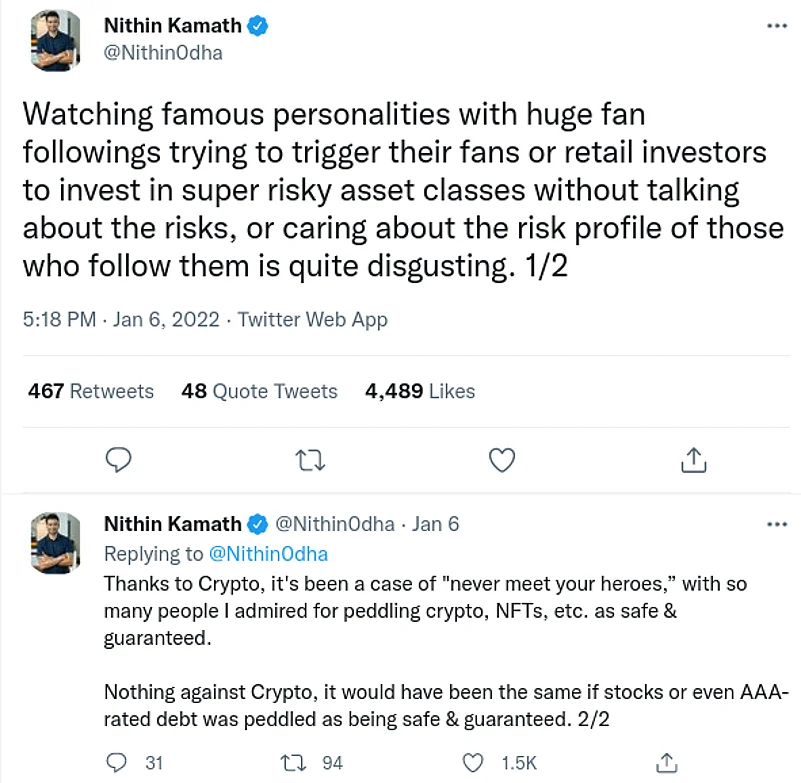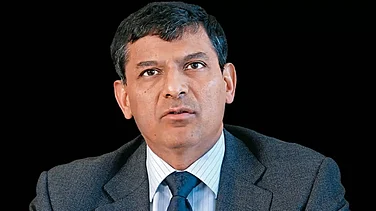Money attracts money! This statement could not have been more true for the crypto industry. More than 300 million people globally hold and use cryptocurrency, with India alone accounting for 100 million users, as per various media sources. But since this asset class is not regulated, people have little to no protection in case something goes south. Adding to that is the fact that transactions happen anonymously on the crypto blockchain network, so nobody can trace its origin unless the user is forthcoming.
5 Do’s And Don’ts Of Crypto Investing
Approach crypto investing the same way as other investments—cut out the noise, do proper research and invest only when you are convinced.

India may bring its Crypto Currency and Regulation Bill in the upcoming Budget session of Parliament to tackle some of the pressing issues with crypto currencies, but until that happens, we as investors should be sensible and take crypto investing decisions with care.
Here are a few do’s and don’ts:
Do Not Believe Everything Social Media Says
Social media is abuzz with celebrities supporting one crypto or the other, or pulling it down. Don’t go with the flow. Try to understand the project behind the crypto token you are interested in. If you understand its meaning, only then invest in it. For example, you may have seen several ‘meme’ crypto tokens, some of which have posted astronomical gains. But these have gone up based purely on hype generated by other users. This is called ‘Pumped Up Community-Driven Trading Hypes’. Do not fall prey to this. Understand the specific crypto’s true objective, and if you think of it favourably, invest only then.
Social media also has many self-styled advisors. Stay clear of them. Recently, the CEO of India’s largest stockbroker, Zerodha, Nithin Kamath, tweeted that he gets disheartened seeing people blindly following their favourite celebrities who endorse various cryptos and non-fungible tokens (NFTs) and other similar assets.

Don’t Invest In A Crypto Because Your Neighbour Did So
No two investors are alike. “Ideally, investments should be based on several factors like risk appetite of the investor, expected return, time horizon and others. Based on these factors, investors need to see whether a particular instrument fits into the asset allocation or not,” says Rishad Manekia, Founder and MD, Kairos Capital. Therefore, the investment approach will also differ. And this is true for all investments, not just cryptos.
However, given that many investors, especially young investors, are interested in this asset class but are not aware of the details, they get swayed by what their peers say.
“Crypto is an unregulated instrument and therefore there is no recourse if anything goes wrong. Investors should be cautious of the pitfalls of these instruments and do their own due diligence,” says Manekia.
Just because your friend was lucky enough to get high returns by investing in a crypto, it does not automatically mean the same thing will happen with you too. Do your own research and invest accordingly.
Don’t Try To Make A Quick Buck
Crypto is a very volatile asset and as the coins are traded 24x7, prices move very rapidly. According to data from Coinbase (December 2021), compiled by fool.com, on an average, a global crypto investor holds on to his or her crypto investments for a maximum 93 days, unlike stocks which they hold on to for years. “Crypto assets are relatively new as compared to other asset classes and carry a significant amount of volatility risks. It isn’t a mechanism to make a quick buck. One shouldn’t lose sight of the basics of investing when it comes to crypto assets,” says Sharat Chandra, a blockchain and emerging technology expert and advisor to blockchain start-ups.
Beware of Suspicious ICOs
ICOs or initial coin offerings are similar to a stock initial public offering (IPO). This is when a company mints its first batch of tokens for mass public distribution. But unlike public companies issuing stocks during IPOs, crypto companies have no proven facts or track record. They are simply selling their crypto project’s vision to people, which may or may not be successful. So before investing in any ICO, read its whitepaper if available. The U.S. Securities and Exchange Commission (SEC) published a detailed report regarding ICOs in 2017. It stated: “...investors should understand that to date no initial coin offerings have been registered with the SEC… As with any other type of potential investment, if a promoter guarantees returns, if an opportunity sounds too good to be true, or if you are pressured to act quickly, please exercise extreme caution and be aware of the risk that your investment may be lost.”
Understand Your Risk-Reward Acceptance Level
There is no such thing as a risk-free asset. Even investing in the world’s most valuable asset, gold, has its own set of risks. Crypto is no different. Understand those risks properly and only if you are comfortable with those, take the plunge. For example, if you are taking a risk on Rs1,00,000 to earn Rs500, then that is not a recommended investment choice.
"Like any asset, macroeconomic factors affect the crypto too. Investors must keep in mind that risk and reward go hand in hand and that they need to do their own research before buying into any asset — not just crypto,” says Ashish Singhal, Founder and CEO, CoinSwitch, and Co-chair of IAMAI’s Blockchain and Crypto Asset Council (BACC).
Each investor’s risk-reward tolerance differs. Understand your own; try to find how much capital risk you are willing to undertake to earn this return. This is a tricky area, so it is advisable to consult with a financial advisor to find out your risk appetite.
“At present, if someone makes an investment in crypto, I consider it a speculative investment. It is hard to come up with a fundamental value of any crypto currency and, therefore, it is difficult to say if it is overpriced or under-priced,” says Manekia.



















